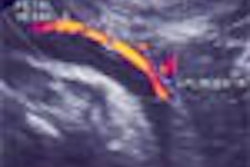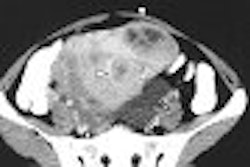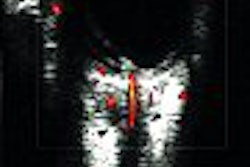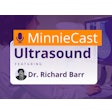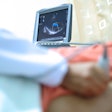Ultrasound beats out traditional methods such as thyroglobulin measurement and iodine whole-body SPECT for the detection of cervical recurrence of differentiated thyroid carcinoma, according to research published in the Journal of Ultrasound in Medicine.
"Classic follow-up methods may not detect cervical disease in some patients with differentiated thyroid carcinoma, and sonography is necessary even in patients apparently free of the disease," wrote researchers from the department of thyroid, endocrinology, and metabolism service of Santa Casa de Belo Horizonte in Minas Gerais, Brazil.
The researchers prospectively evaluated 81 patients with cervical metastases or extrathyroid invasion at first appearance, who underwent clinical examination, iodine whole-body SPECT scanning (WBS), measurement of thyroglobulin (Tg) after thyroxine (T4) withdrawal, and sonography about eight months after thyroidectomy. The patients then received radioiodine treatment. Only patients without distant metastases and anti-Tg antibodies were included in the study (JUM, July 2004, Vol. 23:7, pp. 915-920).
Of the 81 patients, 50 had cervical disease (local recurrence or lymph node metastases), while 31 were free of disease. Clinical examination identified suspected lymph node lesions in only eight patients, and findings were normal in 42 patients with cervical recurrence, for a sensitivity of 16%, according to the study team.
The group also observed an increase in thyroid-stimulating hormone (TSH) levels to greater than 30 mIU/L after T4 withdrawal for four weeks in all cases. The 66% of patients classified as having cervical disease had Tg levels of 2 ng/mL or greater (range, 2.4-28.6 ng/mL; mean, 6.5 ng/mL); Tg produced a specificity of 80.6%.
Iodine-131 scanning in the neck, performed with a dual-head gamma camera, yielded positive results in 29 patients (58%) with cervical recurrence and in three patients with no evidence of disease (90.3% specificity). The combination of Tg measurementand iodine scanning produced a sensitivity of 80%.
Ultrasound was performed with a linear multifrequency 7.5-10-MHz transducer. Sonographic findings were positive in 48 of 50 cases of cervical recurrence for a sensitivity of 96%. The 48 cases included 36 occurrences of lymph node metastases, four patients with thyroid bed disease, and eight with both.
Sonography performed on patients apparently free of disease (negative Tg and WBS results) revealed suspected persistence in 14 other cases. In four of the patients, the suspicion was not confirmed by fine-needle aspiration (FNA). The other patients produced eight cases of lymph node metastases, one patient with thyroid bed disease, and one with both.
Lymph node involvement comprised the cervicolateral compartment in 14 cases, and the central compartment in 30. In the two patients with normal sonographic findings, diagnosis was established on the basis of positive scan results (one with positive Tg results) and surgical exploration, which confirmed tumor remnants in the thyroid bed, the study team wrote.
Four of 31 patients without disease had abnormal lymph nodes on sonography (87% specificity), but FNA and subsequent excisional biopsy failed to confirm the presence of metastases.
The authors concluded that the combination of Tg measurement and WBS failed to detect recurrence in 20% of patients whose diagnosis could be made only by means of sonography. Sonography detected recurrence cases with negative WBS and Tg results with a sensitivity of 94.1%, showing the need for this examination in cases of local recurrence.
"However, we think that, because of its considerably higher sensitivity, lower cost (especially compared with the use of recombinant TSH for WBS), greater practicality in not requiring preparation or discontinuation of therapy, and easy access, sonography should be used as an additional examination even in cases with low Tg levels and negative scan results," they wrote.
By Erik L. RidleyAuntMinnie.com staff writer
July 26, 2004
Related Reading
Routine thyroid cancer procedure may be shortened, April 12, 2004
Erythropoietin may be neuroprotective following cranial irradiation, March 30, 2004
Thyroid radiation may be cancer risk: study, March 4, 2004
Ultrasound guidance boosts thyroid cancer procedure, October 22, 2003
Copyright © 2004 AuntMinnie.com






